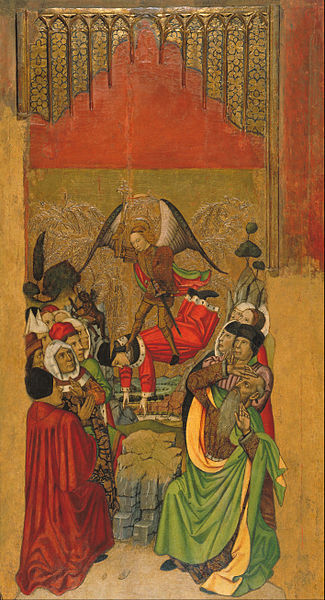The divulgation of Arnau de Vilanova’s eschatological predictions in Paris ushered in a new stage, the spiritual-eschatological stage. Spiritualism developed in new directions and perhaps became more radical, but the most prominent feature in those years was apocalyptic calculations. Replies and counter-replies, objections and responses to the objections brought the controversy between master Arnau and the professional theologians (first the professors of Paris and later the Dominicans) into the personal realm. The basic theses that Arnau defended in numerous works from this phase (numbers 5-32) are the following:
- 1. The Church should know the time of the coming of the Antichrist;
- 2. The Bible allows us to pinpoint the time of the coming of the Antichrist;
- 3. The conditions that make this knowledge possible are first that the speculator investigates the Scriptures not out of curiosity but instead driven by an illumination from God.
Indeed, when asked by the Apostles about the end of time, Jesus Christ provides a clue: “When you see the ‘abomination of desolation’ announced by the prophet Daniel, the reader will understand it” (Matthew 24:15). So what does the prophet Daniel say about the ‘abomination that causes desolation’? If we read Daniel 12:11: “From the time that the daily sacrifice is abolished and the abomination that causes desolation is set up, there will be 1,290 day”. Here, “sacrifice” means the sacrifice of the Old Testament; and the sacrifice being “abolished” is the date when the people of Israel cannot celebrate it any more, precisely because of the dispersion caused by the destruction of the Temple (70). Therefore, if we add the 1290 days, that is “years” (Ezequiel 4:6b: “I have appointed thee each day for a year”), on that we find that “the abomination that maketh desolate”, that is, the Antichrist, will be manifested in the mid-14th century. And one cannot say, as the theologians did, that Jesus Christ had denied knowledge of this time when he says “It is not for you to know the times or the seasons, which the Father hath put in his own power”, because the times that the Father put in his own power are only the day and time (Mark 13:32). What is more, “It is not for you” means that “because of your own natural capacities” and therefore it says nothing about knowledge through revelation. What is more, this phrase was spoken to the Apostles, who would certainly not know the end of time because they did not have to experience it. However, this knowledge is necessary for Christians living near the end of time. And as if that were not enough, in reality the statement by Jesus of Nazareth is not the answer to the question regarding the end of time but to the question: “Lord, are you at this time going to restore the kingdom to Israel?” (Acts 1:6). When correctly interpreted, Acts 1:7 in no way denies the possibility of ascertaining the time of the Antichrist.
The dynamic of the controversy leads to a discussion of none of the other topics: whether or not angels are the only messengers of the revelation, the number of years that had elapsed from the time of Adam until the coming of Jesus Christ, the theological value of the prophetic revelations (Arnau de Vilanova regarded them as “almost the word of God”), the proper interpretation of the theology of the history of Augustine of Hippo and the Glossa ordinaria.
And if the Antichrist is about to come, a strategy should be planned that enabled people to recognise him. The members of the Antichrist, which Arnau equated with his adversaries, were already acting to pave the way. Arnau wrote several works to unmask and denounce them to the authorities. The eschatological controversy thus took on a prophetic air. People must also prepare themselves for a “spiritual war”: the pope should announce that the Antichrist has been born, reform Christianity (clergy, mendicant orders and cloistered orders) and invite pagans, schismatics and the unfaithful to convert to Christianity.
This phase is actually a long hiatus in the life of Arnau de Vilanova.
